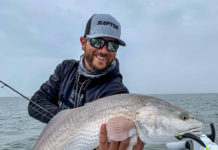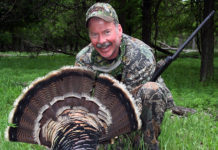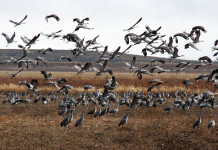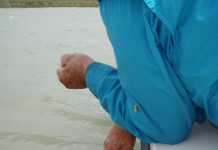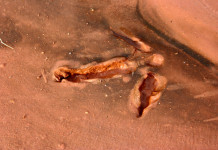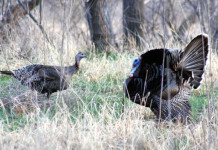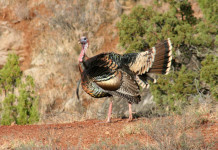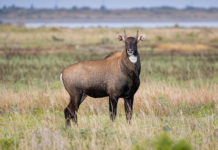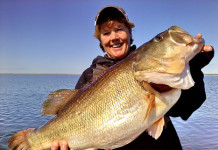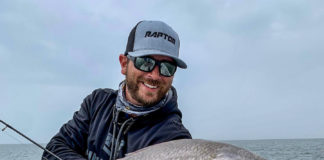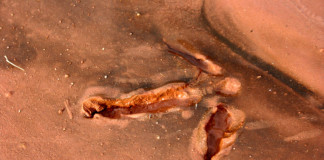The Daily Texas Outdoor Digest is sent to your inbox to keep you up to date about hunting, fishing, conservation and outdoors pursuits making headlines and going viral in the Lone Star State and beyond. It’s free, so subscribe today!
Here’s what’s worth reading today, Tuesday, July 7, 2020:
COVID-19, Africa’s conservation and trophy hunting dilemma
Wildlife conservation hasn’t escaped the impact of the COVID-19 pandemic. This is largely due to the fact that tourism funding, which supports the conservation of wide swaths of Africa and some 23 million livelihoods, has all but dried up.
Wildlife-based tourism in Africa is worth approximately US$71 billion annually. Much of this funds the management of protected areas. For example, the protection of just one white rhinoceros at Kenya’s Ol Pejeta Conservancy costs about US$10,000 each year.
Since the start of the pandemic there’s been a cut to funds for anti-poaching, surveillance and fence line management in most African reserves. Trophy hunting is a key source of this funding. It contributes an estimated $200 million to economies across the continent annually.
Trophy hunting takes place across much of sub-Saharan Africa with South Africa, Namibia and Tanzania holding the lion’s share of the market. The debate over its utility as a source of conservation revenue takes on a new urgency in the light of COVID-19.
Casting about for a pandemic-friendly pastime? Eight reasons to consider fly-fishing
It’s not very often that anyone compares Brad Pitt to a worldwide pandemic, but that’s what’s happening in the world of fly-fishing. While other businesses try to dig themselves out from the damaging effects of the novel coronavirus and quarantine, many fly-fishing shops around the country are noticing a different trend: Business is booming.
“We’ve been doing this for 160 years, and the last time we saw a push this big was when Brad Pitt made ‘A River Runs Through It,’ ” says Simon Perkins, the newly appointed president of fly-fishing giant Orvis Company. The movie was based on the book of the same name by Norman Maclean. Unlike spin (traditional) fishing, which uses bait to catch a lot of fish, fly-fishing uses artificial flies and overhead casting to fool a fish. In general, fishing is on the rise, with states such as Minnesota reporting a 26 percent increase in fishing licenses. But for many, fly-fishing is appealing because of its simplicity and the masterful in-water casting techniques that connect anglers with nature.
“We’ve wanted to learn for years so that we could fly-fish while backpacking into high alpine lakes,” says Katie Stapleton, a California resident who recently took up the activity.
Historically, this is a sport that flies under the radar. Although fly-fishing has seen an increased number of participants over the past decade, it’s still small potatoes when compared with widespread outdoor activities, such as hiking. Fly-fishing saw record participation in 2018 when 6.9 million people tackled it, but those numbers pale in comparison to the 47.9 million hikers who hit the trail during the same year.
Bear conservation efforts prove successful as sightings increase in Northeast Texas
Since April, there has been an uptick in black bear sightings in Bowie, Grayson and Titus counties in northeast Texas. The bears are thought to originate from the neighboring states of Oklahoma and Arkansas, or possibly Louisiana, where resident bear populations are well established and expanding. As the numbers of this iconic species grows, dispersing black bears find their way across state lines into Texas, signaling the possibility of its eventual permanent return to our landscape.
“It is inspiring as a biologist to watch these animals make their return to Northeast Texas after being absent for a century or more,” said Texas Parks and Wildlife Department biologist Penny Wilkerson.
The recovery of black bears in the three-state region has been ongoing for 30-50 years. Thanks to conservation efforts, the Louisiana black bear is no longer listed as a federally threatened species. Similarly, efforts in Oklahoma and Arkansas have increased and expanded bear populations by focusing on habitat conservation and species management.
Bears are secretive but curious and have an excellent sense of smell, with much of their behavior driven by their appetite. These natural characteristics can, however, become a problem when bears find an easy meal from a human-related source. Most sighting reports come from game camera photos around game feeders dispensing corn or pelleted feed.
You now must have a hunting or fishing license to hike in any State Wildlife Areas in Colorado
The Colorado Parks and Wildlife Commission recently adopted a rule change, requiring all visitors 18 or older to possess a valid hunting or fishing license to access any State Wildlife Area or State Trust Land leased by Colorado Parks and Wildlife. This new rule was in effect beginning July 1.
“Colorado Parks and Wildlife manages over 350 State Wildlife Areas and holds leases on nearly 240 State Trust Lands in Colorado, which are funded through the purchase of hunting and fishing licenses,” said Southeast Regional Manager Brett Ackerman. “The purpose of these properties is to conserve and improve wildlife habitat, and provide access to wildlife-related recreation like hunting and fishing that are a deep part of Colorado’s conservation legacy.”
Because these properties have always been open to the public, not just to the hunters and anglers that purchased them and pay for their maintenance, many people visit these properties and use them as they would any other public land. As Colorado’s population — and desire for outdoor recreation — has continued to grow, a significant increase in traffic to these SWAs and STLs has disrupted wildlife, the habitat the areas were acquired to protect, and the hunters and anglers whose contributions were critical to acquiring these properties.
Because funding for these properties is specifically generated by hunting and fishing license sales and the resulting federal match, requested options such as “hiking licenses” or “conservation permits” would not allow for the maintenance and management needed. Any funding from one of these conceptual licenses or permits would reduce the federal grant dollar for dollar and thus fail to increase CPW’s ability to protect and manage the properties.
Experts fear bad tick season amid coronavirus pandemic
As if there wasn’t enough to worry about in 2020, experts are warning about a potentially bad tick season. The Lyme Disease Research Group reports a mild winter could mean an especially rough time for ticks.
Medical experts fear that many people who’ve been stuck inside due to coronavirus may “let their guard down” once they’re able to venture outdoors and not pay attention to tick bite prevention.
Some symptoms of Lyme disease are very similar to the symptoms of COVID-19, according to medical professionals. Ticks can carry Lyme and other dangerous diseases that can be severe if not treated properly.
The Centers for Disease Control and Prevention recently announced an increase in tick-borne diseases like Lyme disease and health officials in Pennsylvania recently addressed the issue.
Russia warns against marmot hunting amid plague scare
Russian health officials have stepped up border controls and are warning residents in Western Siberia not to hunt and eat marmots after neighboring Mongolia and China reported three cases of bubonic plague.
Mongolia last week quarantined its western region of Khovd near the border with Russia after identifying two suspected cases of bubonic plague linked to consumption of meat from the large rodents. On Sunday, authorities in the city of Bayan Nur in the Chinese region of Inner Mongolia issued a notice after a hospital reported a case of the plague — one of the deadliest diseases in history.
Russia’s consumer protection watchdog Rospotrebnadzor said its officials and authorities in the Altai republic have begun patrolling a district near Khovd to warn shepherds about the dangers of hunting marmot, according to TASS.
“They are curbing illegal hunting on marmots and conducting an awareness campaign with breeders about the strict rules,” Rospotrebnadzor was quoted as saying.
Massive fish pulls 2 Florida anglers off boat and into the water during struggle to reel it in
Some fish really know how to put up a fight. A birthday fishing trip in Cape Coral, Fla., resulted in an angler not just reeling in a possible catch-of-a-lifetime, but also a really great story. Unfortunately, the struggle did leave the two men soaking wet.
Ben Chancey, a captain with Chew On This Charters, was hired to take a group on a surprise fishing trip. Mike, who was celebrating his 30th birthday, had been told he was going on a manatee sightseeing trip. The trip had been planned by Eric, a soldier who fought in Afganistan, and his girlfriend Jenny, a registered nurse. According to Chancey, Mike hooked a massive grouper fish that had been spotted in “ultra-clear” water. According to the captain, Mike appeared to be doing a good job with the fish, so Chancey let him try to reel it in on his own.
“After about 10 seconds of fighting the giant fish on his own he was pulled down to the gunnel and was lifted overboard by the giant fish,” Chancey said. “When he went over he grabbed the side of the boat and then had the rod pulled out of his hand. The rod was lost.”
Amazingly, Jenny spotted the rod about 20 minutes later “on the bottom in the crystal clear 40-foot-deep water.” They initially planned on swimming down to grab the rod, but they lucked out and hooked it with the boat’s anchor. They then noticed that the grouper was still attached to the line.
Six men sentenced for poaching 16 elk, three mule deer in Idaho
Six men pleaded guilty and were sentenced for the poaching of 16 elk and three mule deer in eastern Idaho. Jay Reeder, Brandon Porter, Rick Earl, Jesse Earl, Dustin Hollingsworth and Brian Miller reached plea agreements for killing the 19 animals, which included several trophy class animals in the fall of 2018 near Preston. All of the men are from Preston, except for Miller, who is from Pennsylvania.
The Idaho Department of Fish and Game started investigating the case after, over several months, many animals were poached on Reeder Ranch and surrounding property.
The department said the killings came with a complete disregard for season, weapon restrictions and tagging requirements. The men left most of the elk carcasses to waste, only taking the antlers and some cuts of meats.
“It seemed as though they just couldn’t stop killing,” said Cody Allen, the IDFG regional investigator.
Your suggestions needed to improve fishing in Gulf
The Gulf of Mexico Fishery Management Council is looking for input from the public on how to improve fishing in the Gulf of Mexico. Many fisherman say there are too many regulations, others believe there may not be enough. The Council will submit public input to see what changes need to be made.
Here is the specific information the Council is looking for.
“The Gulf of Mexico Fishery Management Council would like your help to identify ways that would remove barriers to fishing while continuing to follow sustainable practices defined by the Magnuson-Stevens Fishery Conservation and Management Act and other applicable federal laws. Specifically, we’re asking you to identify existing regulations that may be outdated or unnecessarily burdensome to fishermen. We invite you to also suggest changes to our guidance documents or Council procedures that may reduce barriers to American fishing.”
Stay in the Know With The Daily Texas Outdoor Digest
If you haven’t subscribed yet, there’s no better time than right now (We hate spam and we won’t share your information with anyone. That’s just not cool):


